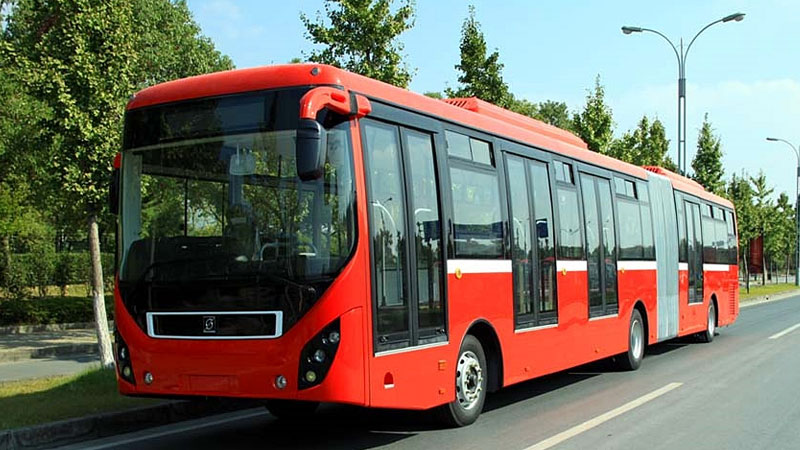The federal government has given yet another completion date of the Metro Bus extension project from Peshawar Mor to the New Islamabad International Airport as of March 2020.
According to the details, a meeting of the Senate Standing Committee on Planning, Development, and Reforms was held in which the Secretary Planning told that the work on only two parts of the extension project of Metro Bus is remaining, which will also be completed by March 2020. The extension project from Peshawar Mor to New Islamabad International Airport consists of four parts, out of which the work on two parts is already completed. The meeting in the Parliament House was chaired by Senator Agha Shahzaib Durrani. It was also attended by Senator Rukhsana Zuberi, Senator Sassui Palijo, Senator Mir Kabeer Shahi, Chairman PEC, Chairman NHA, Secretary Planning, and other higher officials of the government. The discussion took place in response to the directions passed by the Committee earlier that the project shall be given top priority. Moreover, it was also told that the additional amount required for the completion of the project should be taken from other slow-moving projects.
The estimated cost of the 26-km long extension project was over Rs.18 billion; however, the project is expected to be completed in Rs.14 billion. The total number of stations on the route is eight, that includes seven on the main course and the last one being at the New Islamabad International Airport. The project is further divided into four packages, as follows:
- Package I (8 km)
- Package II (3.8 km)
- Package III (8.3 km)
- Package IV (5.4 km)
Out of these, according to the official figures, Package I and Package II are 90% and 85% completed respectively, whereas the rest of the two have almost reached their completion stage. Also, there is no station built from the Motorway to the airport, which is against the project plan according to which there has to be one station established after a distance of 1 km. Moreover, the project shall also be completed immediately for several necessary reasons. The traffic load on the main artery of the federal capital, i.e. Kashmir Highway, has increased tremendously due to the construction of the new airport near to Fateh Jang. The completion of the metro bus extension project will reduce this traffic congestion on Kashmir Highway considerably. The committee has, therefore, urged the authorities to speed up the remaining work of the extension project of the Metro Bus system.
Furthermore, the committee also questioned the year-wise increase in the toll tax on M-1 and M-2 motorways. It was of the view that between 2005 and 2019, the rates of toll tax at M-1 for the passenger cars have increased from Rs.80 to Rs.240 while the rate has gone up from Rs.100 to Rs.400 for the wagons. Similarly, the rate of toll tax for mini-buses and buses has also gone up from Rs.140 to Rs.550 and Rs.210 to Rs.790, respectively. On the other hand, the toll tax rates on Lahore-Islamabad Motorway M-2 have also seen a steep rise in the above-mentioned period. For passenger cars, the tax rate has gone up from Rs.250 to Rs.750. In the same way, toll tax for wagons witnessed an increase from Rs.300 to Rs.1250. For mini-buses and buses, the rate went up from Rs.176 to Rs.300 and Rs.450 to Rs.2510, respectively. As mentioned in the meeting, Rs.92 billion is spent by the National Highways Authority (NHA) on the renovation and maintenance of motorways networks across the country. It’s primarily due to the significant increase in the average number of automobiles using the motorways.
Will the government be able to finish the Metro Bus extension project within their specified time? Share your thoughts in the feedback section and stay tuned to PakWheels for more updates.



“Furthermore, the committee also questioned the year-wise increase in the toll tax
on M-1 and M-2 motorways. It was of the view that between 2005 and
2019, the rates of toll tax at M-1 for the passenger cars have increased
from Rs.80 to Rs.240 while the rate has gone up from Rs.100 to Rs.400
for the wagons. Similarly, the rate of toll tax for mini-buses and buses
has also gone up from Rs.140 to Rs.550 and Rs.210 to Rs.790,
respectively. On the other hand, the toll tax rates on Lahore-Islamabad
Motorway M-2 have also seen a steep rise in the above-mentioned period.
For passenger cars, the tax rate has gone up from Rs.250 to Rs.750. In
the same way, toll tax for wagons witnessed an increase from Rs.300 to
Rs.1250. For mini-buses and buses, the rate went up from Rs.176 to
Rs.300 and Rs.450 to Rs.2510, respectively.”
The motorway toll has been increased drastically by FWO ever since it took over the renovation/maintenance of the project segments. FWO is a government organization (i.e. on taxpayer money) and it must be investigated why the Armed Forces are so eager to increase the revenue they get from the motorways. Further, it must be ensured that any business by government backed organizations and bodies must be not-for-profit so that government money is never used to compete with the private sector businesses. It provides an unfair and uneven business environment.